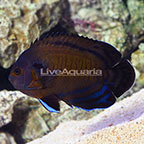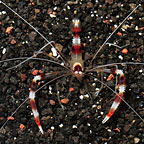
Additional locales and sizes may be available!
Additional locales and sizes may be available! Email me when availableQuick Stats
What do these Quick Stats mean? Click here for more information
What do these Quick Stats mean? Click here for more information
Overview
A 300 gallon or larger aquarium with plenty of swimming room is required, due to its size. The aquarium should contain live rock and hard corals (skeletons are acceptable). The Bicolor Parrotfish will eat algae off the corals and rocks, and chew on the hard corals to eat the animals within.
The diet should be supplemented with a variety of herbivore preparations, flaked foods, and meaty preparations.
Approximate Purchase Size: Small: 1" to 3"; Medium: 3" to 5"; Large: 5" to 8"






